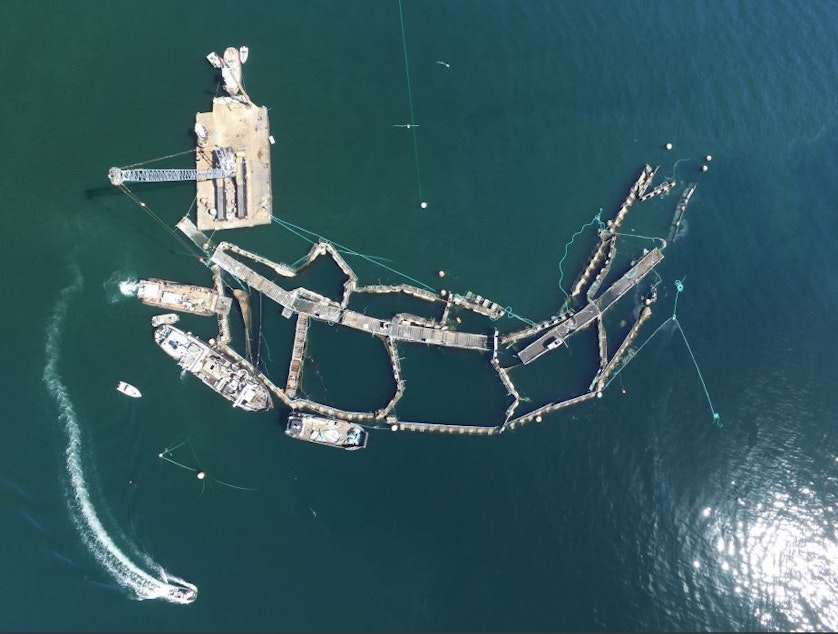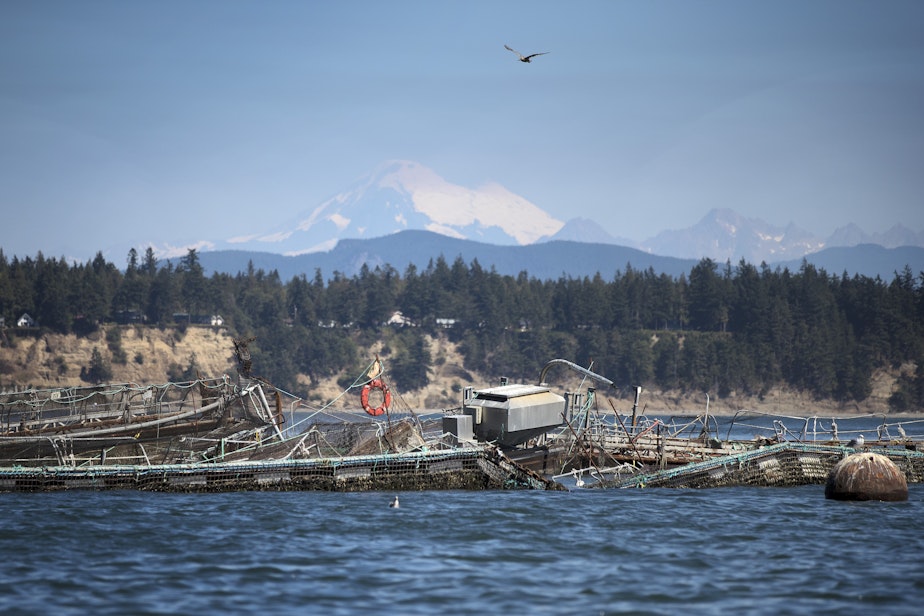Salmon-spilling company ends fight to resume fish farming at Puget Sound sites

The company behind a massive spill of Atlantic salmon in 2017 has thrown in the towel on its efforts to keep farming fish at two sites in Puget Sound.
Cooke Aquaculture withdrew its appeal Friday of a 2022 Washington Department of Natural Resources order to shut down its floating farms off Bainbridge Island, just west of Seattle, and Hope Island in Skagit County.
New Brunswick, Canada-based Cooke Aquaculture is one of the world's largest aquaculture businesses, with operations in 14 countries.
The company’s decrepit Cypress Island farm, rusting and overgrown with algae and other marine life, tore apart in August 2017, releasing 250,000 fish from another ocean into Puget Sound.
RELATED: Divers' videos capture new suspects in salmon farm collapse
In a press release, the company said the department withheld public documents, making it impossible to argue the case at Thurston County Superior Court effectively.
"At the rate DNR has produced records to date, it would take another six to seven years for all responsive records to be produced by DNR, which is an untenable and inconceivable situation," Cooke Aquaculture said in a statement.
"A further hearing on this matter is futile without Cooke having an opportunity to review DNR's internal records," the company concluded.
In an email to KUOW, Department of Natural Resources spokesperson Michael Kelly accused the company of going on "a lot of fishing expeditions" for public records.
"As a public agency, we have a proud record of providing records to litigants and the public as a whole as thoroughly and quickly as possible," Kelly said.
Public Lands Commissioner Hillary Franz has characterized Cooke's actions as "corporate tantrums."
"This is truly the end of dangerous and destructive net pens in the state," Franz said in a press release. "Cooke Aquaculture has finally realized that its fight to continue to put our waters and salmon at risk was futile."

Despite Franz's statement, the end is not yet assured.
In recent weeks, Franz's department began what is expected to be a year-long public process — complete with public comment, public meetings, and tribal consultations — to consider and possibly enact a permanent ban on commercial fish-farming in Washington waters.
While several Washington tribes have opposed fish farming, the Jamestown S'Klallam Tribe is now working with Cooke Aquaculture to start farming native steelhead and black cod off Port Angeles.
"DNR and Commissioner Franz should be transparent in how they justify the unscientific conclusions that led to an arbitrary, unilateral ban on native species farming in our state aquatic lands," Jamestown S'Klallam Tribe Chair and CEO W. Ron Allen said in an email to KUOW.
The Washington state Legislature banned commercial farming of nonnative fish, such as Atlantic salmon, in 2018.
RELATED: That Atlantic salmon farm was on its last legs — and Washington state knew it
Before its operations were shut down, Cooke shifted to farming native steelhead (a close relative of Pacific salmon) at its Puget Sound sites. The fish were sterile females, so if any did escape, they would be unable to reproduce and compete with wild salmon for habitat or food.
Whether the Cooke-Jamestown S'Klallam Tribe venture, known as Salish Fish, can launch a steelhead and black cod farm off Port Angeles depends, in part, on the outcome of the rulemaking process the Department of Natural Resources has begun.




